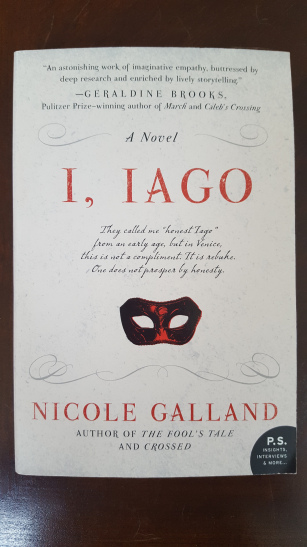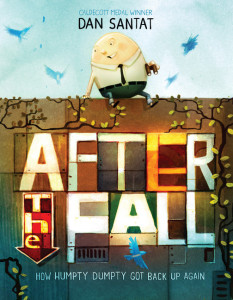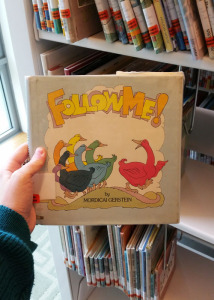Who doesn’t love a well-written villain? This book explores Shakespeare’s Othello from the point of view of Iago, the character responsible for Othello’s demise.
 I love the cover design on this book – simple and elegant.
I love the cover design on this book – simple and elegant.
Galland’s story explores how Iago, arguably a very passionate character, became a villain who carefully coordinated vengeful plot that, in Galland’s telling, he loses control of. The Iago of Shakespeare’s play seems to be in control until the very end, but in the novel, he not only begins to lose control of his plot, but he’s very aware of that fact.
The Iago of the novel starts out as an ambitious man and arduous lover turned husband of an intelligent, passionate woman that he’s not always quite sure how to relate to. Like many couples, the traits that attract Iago and Emilia to each other become points of contention once they’re married – something anyone who has ever been in a relationship can relate to. Combine this with Iago’s inner insecurity and raging jealousy, and you’ve got all the ingredients needed for an elevated tragedy.
Another thing I appreciate about this book is that it delves into Iago’s backstory and the romance between Iago and Emilia. Othello, as a character, doesn’t appear until the end of Chapter 12, but I found that I didn’t miss him. I knew he was coming, and I wanted to understand who Iago was at the point where his life intersected with the General’s.
What’s super intriguing about this book is that Iago is not a character filled with hate – what he’s filled with is a sort of thwarted love. He’s not entirely sure how to be a good husband to Emilia, or if he even deserves her. He feel slighted by his General, who he truly does love, and overshadowed by Cassio.
In this story, one of the greatest literary villains is transformed from a cold, conniving manipulator into a flawed but relateable human. That is, perhaps, what makes Iago such a successful character – the fact that, despite his grievous misdeeds, the reader can’t help but relate to how he feels.
I’m also going to throw in just a tad bit of analysis here just for fun. Back in my grad school days, we would talk about a thing called triangulation of desire. This is a bit of a complex concept, and manifests in different ways, but one of the elements of it is the idea that when you cannot admit to a desire, instead you’ll desire what the true object of your affection desires. One way this plays out in literature is when one man competes with another man for a woman’s attention, when really what he desires is the other man’s attention.
That’s not exactly what’s happening here, and I do believe that the love story between Iago and Emilia is sincere. Yet when Iago first meets Othello, Othello says something and Iago tells us, “my heart raced.” When Othello whispers private commentary to Iago about the ball they’re attending, Iago tells us that “these moments made the evening heady to me, heady almost as the night I first danced with Emilia.”
Couple that with the fact that it’s at the point that Iago meets and begins to serve Othello that his marriage to Emilia – which Iago insists is nearly perfect – becomes strained, and you’ll begin to see a bit of a triangular situation arise. To the last pages of the novel, Iago insists that he truly loves them both.
Why you should read it:
- If you love a good tragedy, this is your book. The entire book, and everything we learn about Iago, is leading us toward the inevitable tragic ending. What’s even more tragic is that you will likely leave this story feeling like Iago was not a one-dimensional, evil-for-evil’s-sake character. You’ll grieve for him as much as for the people whose deaths he is responsible for.
- There are clever little shout outs to other Shakespeare plays – famous lines or phrases that Galland works into her characters’ dialogues. I love little touches like that. If you read this book, see how many of them you can find.
- If you love villains, and understanding what makes them tick, this book will take you on a ride through the mind of a villain that you’ll find yourself, at times, sympathizing with.
- Iago and Emilia’s relationship is passionate and intense, and anyone who has ever experienced a very intense kind of love knows how quickly it can go sour. When intense love sours, it often curdles into something tragic – and we all know how this one ends.
- Emilia has way more agency in the book than she has in the play, which makes her interesting, because her agency sometimes becomes problematic. Desdemona, by comparison, is not the most interesting woman in the book – she’s placid compared to Emilia. I don’t think this is bad writing; I am feel that Galland made Desdemona a bit more muted on purpose.
Reading tips for writers:
- For anyone writing historical fiction, where the facts and events of a person’s life are well-known, or doing what Galland did and retelling a well-known story in a different way, this is a great book to study. Reread Othello first, or at least a synopsis of it. Or watch the Kenneth Branagh/Laurence Fishburne movie version. Pay attention to how Galland weaves the play into her story – where she follows Shakespeare down to the word, and where she takes some slight creative license.
- If you want to write some very subtle homoeroticism that doesn’t progress into anything overt, study Galland’s technique. Watch how Iago uses some of the same words to describe Iago as he uses to describe his wife; how he has the same feelings about Iago as he does about his wife. Watch how his relationship with Emilia mirrors his relationship with Othello at key points in the narrative.
- Take the ‘find the places Galland quotes other Shakespeare plays’ game one step further – when you find those spots, think about what she uses, and why she uses it at that particular time and in that particular context. Are these merely inside jokes, or something more?
Bonus: Click here to see some scanned images of the original printings of Othello from the Folger Shakespeare Library. Click the ‘Early Printed Text’ link to see them.
Advertisements Share this:




